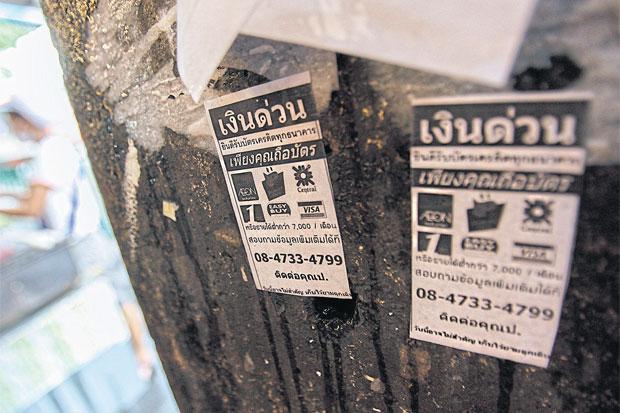Thailand: Loan shark debt down B20 billion
Debts owed to loan sharks by registrants in the government’s subsidy and welfare scheme for poverty have declined by 20 billion baht this year, thanks to the government’s efforts to tackle the problem, says the head of the Fiscal Policy Office (FPO).
Krisada Chinavicharana, director-general of the FPO, said the 14.1 million people who registered for the state aid scheme this year disclosed that they owed a combined 70 billion baht to underground lenders, down from the 90 billion the 8.27 million people disclosed who signed up for the programme last year.
The 90 billion baht consists of both principal and interest, with the principal estimated at 50 billion baht based on the assumption that 30% is interest, he said.
The Finance Ministry plans to bring loan sharks and debtors to a negotiation process under the Interior Ministry’s committee on settlement. Two state-owned banks — the Government Savings Bank (GSB) and the Bank for Agriculture and Agricultural Cooperatives (BAAC) — stand ready to provide refinancing if the talks conclude successfully, Mr Krisada said.
The banks are offering loans worth 10 billion baht combined to refinance underground lending, and 3 billion has already been taken out.
Dealing with loan sharks has been a top government priority. The Finance Ministry licensed both nanofinance and so-called picofinance businesses with an aim of better facilitating low-income earners accessing formal financial sources and avoiding underground lenders.
The government is also using the GSB and BAAC as instruments to curb the problem. Both banks are offering 5 billion baht each in loans to help those earning 15,000 baht or less a month to refinance loan shark debts.
Nanofinance has done little to weaken loan sharks’ bite, as operators can only lend for occupational purposes. In response, the Finance Ministry recently introduced picofinance, where operators must have minimum registered capital of 5 million baht and operations confined to a particular province. They are permitted to lend for general purposes and limited to loans of 50,000 baht per borrower at a maximum rate of 36% a year.
Nanofinance operators can lend a maximum of 100,000 baht per borrower and have a ceiling interest rate of 36% a year. Operators must have a minimum of 50 million baht in registered capital.
Since picofinance licences were offered last December, there have been 155 applicants, with 13 already winning licences. Only nine nanofinance licences were issued. Mr Krisada said Nakhon Nayok province aims to settle debts owed to 4,000 loan sharks soon.
Source: http://www.bangkokpost.com/business/finance/1273243/loan-shark-debt-down-b20-billion


 Thailand
Thailand




